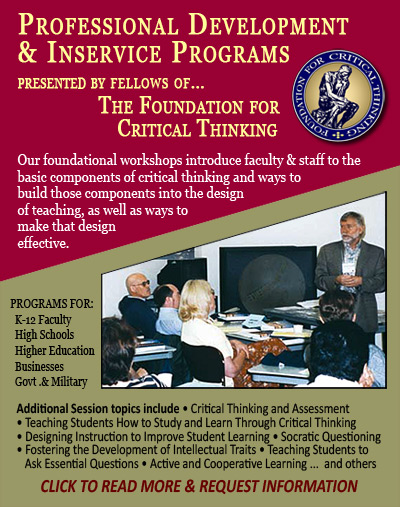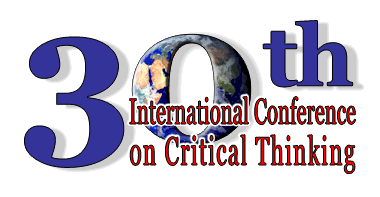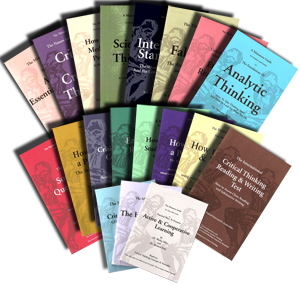This year, the Foundation for Critical Thinking is celebrating 30 years at the forefront of educational reform focused on advancing fairminded critical societies. We are sponsoring several academic events this year, including the 30th Annual International Conference on Critical Thinking. We invite you to join us for this special conference. We also recommend that you explore our thinker's guides, books, professional development programs and other resources aimed at fostering critical thinking in all subjects and disciplines, in all parts of human life. You will find below an introduction to a few of our events and resources.
Spring 2010 Workshops in Critical Thinking

March 20 and 21st, 2010
at the Berkeley Doubletree Marina, Berkeley, California
Featuring the Following Workshop Topics...
choose one
- Integrating a Comprehensive Understanding of Critical Thinking into Effective Design for Teaching and Learning Academic Content… Dr. Richard Paul
- Placing a Robust Framework for Critical Thinking At the Heart Of Your Institution’s Mission, Accreditation or Reaccreditation Process… Dr. Linda Elder
- Approaching Students as Thinkers; Cultivating the Intellect… Dr. Enoch Hale
Read more about this event - Register online for this event
{"id":3018,"title":"Spring 2010 Workshops in Critical Thinking","author":"","content":"<p><span style=\"font-family: Verdana,Geneva,Arial,Helvetica,sans-serif; color: #660033; font-weight: bold;\"><strong><img src=\"https://www.criticalthinking.org/image/pimage/Berkley_CampMed.jpg\" alt=\"\" hspace=\"15\" vspace=\"10\" align=\"right\" /><br /> March 20 and 21st, 2010 </strong></span><span><br /> </span><span>at the Berkeley Doubletree Marina, Berkeley, California</span></p>\r\n<p><span style=\"font-family: Verdana,Geneva,Arial,Helvetica,sans-serif; color: #660033; font-weight: bold;\">Featuring the Following Workshop Topics...</span></p>\r\n<p><span style=\"font-family: Verdana,Geneva,Arial,Helvetica,sans-serif; color: #660033; font-weight: bold;\"><span style=\"color: #3366ff;\">choose one</span><br /> </span></p>\r\n<ul>\r\n<li><span style=\"color: #000080;\"><strong>Integrating a Comprehensive Understanding of Critical Thinking into Effective Design for Teaching and Learning Academic Content&hellip; Dr. Richard Paul <br /> <br /> </strong></span></li>\r\n<li><span style=\"color: #000080;\"><strong>Placing a Robust Framework for Critical Thinking At the Heart Of Your Institution&rsquo;s Mission, Accreditation or Reaccreditation Process&hellip; Dr. Linda Elder<br /> <br /> </strong></span></li>\r\n<li><span style=\"color: #000080;\"><strong>Approaching Students as Thinkers; Cultivating the Intellect&hellip; Dr. Enoch Hale<br /> <br /> </strong></span></li>\r\n</ul>\r\n<p><span> <a style=\"font-weight: bold;\" href=\"https://www.criticalthinking.org/\">Read more about this event</a>&nbsp;&nbsp;&nbsp; -&nbsp;&nbsp; </span><a style=\"font-weight: bold;\" href=\"https://www.criticalthinking.org/store-page.cfm?P=products&amp;ItemID=388&amp;catalogID=219&amp;cateID=135\">Register online for this event </a></p>\r\n<hr />\r\n<p><br style=\"clear: both;\" /></p>","public_access":"1","public_downloads":"1","sku":"","files":{},"images":{}}
 Professional Development Specialized for Your Department or Program
Professional Development Specialized for Your Department or Program
Critical thinking is not isolated or unrelated to other important goals in education, rather, it is a seminal goal. When appropriately introduced into instruction, critical thinking facilitates and enhances numerous other ends. Critical thinking is best conceived, therefore, as the hub around which other educational ends cluster.
As students learn to think more critically, they become more proficient in thinking within and across systems and their associated content. They develop skills, abilities, and values essential to success in everyday life.
To accomplish these goals, those who teach must have a solid grounding in critical thinking and in the teaching strategies essential to it. Click on the following links for more information about each one...
If you are interested in more information about our professional development programs , please fill out our inservice request form or call 800.833.3645
{"id":3019,"title":"","author":"","content":"<p><a href=\"https://www.criticalthinking.org/professionalDev/inservice_request.cfm\"><img src=\"https://www.criticalthinking.org/image/pimage/INSERVICE_AD.jpg\" border=\"0\" alt=\"Professional Development Inservices and Seminars\" hspace=\"10\" vspace=\"8\" align=\"right\" /></a> <strong class=\"head\">Professional Development Specialized for Your Department or Program</strong></p>\r\n<p><span>Critical thinking is not isolated or unrelated to other important goals in education, rather, it is a seminal goal. When </span><span>appropriately i</span><span>ntroduced into instruction, critical thinking facilitates and enhances numerous other ends. Critical thinking is best conceived, therefore, as the hub around which other educational ends cluster. <br /> <br /> As students learn to think more critically, they become more proficient in thinking within and across systems and their associated content. They develop skills, abilities, and values essential to success in everyday life. </span></p>\r\n<p><span>To accomplish these goals, those who teach must have a solid grounding in critical thinking and in the teaching strategies essential to it.&nbsp; Click on the following links for more information about each one...<br /> </span></p>\r\n<ul>\r\n<li><a style=\"font-weight: bold;\" href=\"https://www.criticalthinking.org/professionalDev/k12.cfm\">K-12</a></li>\r\n<li><a style=\"font-weight: bold;\" href=\"https://www.criticalthinking.org/professionalDev/higherEducation.cfm\">Higher Education</a></li>\r\n<li><a style=\"font-weight: bold;\" href=\"https://www.criticalthinking.org/professionalDev/business.cfm\">Business</a></li>\r\n<li><a style=\"font-weight: bold;\" href=\"https://www.criticalthinking.org/professionalDev/onlineCourses.cfm\">Online Courses For Those Who Teach </a><a style=\"font-weight: bold;\" href=\"https://www.criticalthinking.org/professionalDev/InstAward2006.cfm\"><br /> </a></li>\r\n</ul>\r\n<p><span>If you are interested in more information about our professional development programs , <a href=\"https://www.criticalthinking.org/professionalDev/inservice_request.cfm\">please fill out our inservice request form</a> or call 800.833.3645 <br /> </span></p>\r\n<hr />\r\n<p><br style=\"clear: both;\" /></p>","public_access":"1","public_downloads":"1","sku":"","files":{},"images":{}}
Join us for the World's Oldest Conference on Critical Thinking!

CONFERENCE THEME:
How To Teach Students To Master Content By Developing A Questioning Mind
July 19 - 22, 2010
Preconference: July 17-18
at the Claremont Resort Hotel & Spa
in Berkeley, California
Join us for a very special celebration of 30 years at the forefront of educational reform through the advancement of fairminded critical thinking.
{"id":3020,"title":"","author":"","content":"<p><span style=\"font-family: Verdana,Geneva,Arial,Helvetica,sans-serif; color: #3366ff; font-weight: bold;\">Join us for the World's Oldest Conference on Critical Thinking!</span><br /> <a href=\"https://www.criticalthinking.org/Conference/2010_Conference.cfm\"><img src=\"https://www.criticalthinking.org/image/pimage/30THCONFad-web2.gif\" border=\"0\" alt=\"\" hspace=\"8\" vspace=\"8\" align=\"left\" /></a><br /> <strong><span style=\"color: #000080;\">CONFERENCE THEME:</span></strong> <span style=\"font-family: Verdana,Geneva,Arial,Helvetica,sans-serif; color: #660033; font-weight: bold;\"><strong><br /> </strong></span><span>How To Teach Students To Master Content By Developing A Questioning Mind</span><span><br /> <span><br /> </span></span><span><span style=\"color: #800000;\"><strong>July 19 - 22, 2010</strong></span><span><span style=\"color: #800000;\"><br /> </span><strong><span style=\"color: #800000;\">Preconference:&nbsp; July 17-18<br /> </span> </strong></span></span></p>\r\n<p style=\"text-align: left;\"><span><span style=\"color: #000080;\"><strong>at the Claremont Resort Hotel &amp; Spa </strong></span><br /> <span style=\"color: #000080;\"><strong>in Berkeley, California</strong></span></span> <br /> <span>Join us for a very special celebration of 30 years at the forefront of educational reform through the advancement of fairminded critical thinking. <br /> <br /> </span></p>\r\n<hr />\r\n<p><br style=\"clear: both;\" /></p>","public_access":"1","public_downloads":"1","sku":"","files":{},"images":{}}
Critical Thinking Resources from our Bookstore
The Foundation for Critical Thinking offers instructional materials that can be used in virtually every subject and discipline. Click on the titles below to learn about each one...
We must take command of our minds, work actively for justice in the world, and focus on values that are universal, values we can share with all rational people of good will. We must cultivate intellectual humility, integrity, perseverance, and empathy in ourselves, and in our students. Disciplined and skilled thinking are no longer luxuries but necessities, no longer add-ons for enrichment programs, but core requirements for every student in every subject on every day.
Richard Paul and Linda Elder, 2004
{"id":3021,"title":"Critical Thinking Resources from our Bookstore","author":"","content":"<table border=\"0\" cellpadding=\"10\" align=\"right\">\r\n<tbody>\r\n<tr>\r\n<td>\r\n<div style=\"width: 290px;\"><strong class=\"head\"><span style=\"text-decoration: underline;\">Thinker's Guide Series</span></strong><br /> Our most popular series of texts <a href=\"https://www.criticalthinking.org/store-page.cfm?go=1&amp;P=subcats&amp;catalogID=224&amp;cateID=132\">available separately</a> or in the full <a href=\"https://www.criticalthinking.org/store-page.cfm?P=products&amp;ItemID=155&amp;catalogID=224&amp;cateID=224\">Set of Thinker's Guides</a>. <br /> <a href=\"https://www.criticalthinking.org/store-page.cfm?go=1&amp;P=subcats&amp;catalogID=224&amp;cateID=132\"><img src=\"https://www.criticalthinking.org/image/thinkersguides-displayed.jpg\" border=\"0\" alt=\"\" vspace=\"4\" width=\"300\" height=\"285\" /></a></div>\r\n</td>\r\n</tr>\r\n</tbody>\r\n</table>\r\n<p>The Foundation for Critical Thinking offers instructional materials that can be used in virtually every subject and discipline.&nbsp; Click on the titles below to learn about each one...</p>\r\n<ul>\r\n<li><a style=\"font-weight: bold;\" href=\"https://www.criticalthinking.org/store-page.cfm?go=1&amp;P=subcats&amp;catalogID=224&amp;cateID=132\">THINKER'S&nbsp;GUIDES</a></li>\r\n<li><a style=\"font-weight: bold;\" href=\"https://www.criticalthinking.org/store-page.cfm?go=1&amp;P=subcats&amp;catalogID=214&amp;cateID=132\">BOOKS</a></li>\r\n<li><a style=\"font-weight: bold;\" href=\"https://www.criticalthinking.org/store-page.cfm?go=1&amp;P=subcats&amp;catalogID=215&amp;cateID=132\">VIDEOS</a></li>\r\n<li><a style=\"font-weight: bold;\" href=\"https://www.criticalthinking.org/store-page.cfm?go=1&amp;P=subcats&amp;catalogID=227&amp;cateID=132\">BUNDLES</a></li>\r\n<li><a style=\"font-weight: bold;\" href=\"https://www.criticalthinking.org/store-page.cfm?go=1&amp;P=subcats&amp;catalogID=217&amp;cateID=132\">MATERIALS</a></li>\r\n<li><a style=\"font-weight: bold;\" href=\"https://www.criticalthinking.org/store-page.cfm?go=1&amp;P=subcats&amp;catalogID=226&amp;cateID=132\">TESTS</a><a href=\"https://www.criticalthinking.org/professionalDev/inservice_request.cfm\"><br /> </a></li>\r\n</ul>\r\n<p>&nbsp;</p>\r\n<div style=\"border: 1px solid navy; padding: 14px; overflow: visible; background-color: #ffffcc; width: 370px; text-align: left;\">&nbsp;<strong><span style=\"font-size: xx-small;\">W</span></strong>e must take command of our minds, work actively for justice in the world, and focus on values that are universal, values we can share with all rational people of good will. We must cultivate intellectual humility, integrity, perseverance, and empathy in ourselves, and in our students. Disciplined and skilled thinking are no longer luxuries but necessities, no longer add-ons for enrichment programs, but core requirements for every student in every subject on every day. <br />\r\n<div><br /> Richard Paul and Linda Elder, 2004</div>\r\n</div>\r\n<p>&nbsp;</p>\r\n<p><br style=\"clear: both;\" /></p>","public_access":"1","public_downloads":"1","sku":"","files":{},"images":{}}

 Professional Development Specialized for Your Department or Program
Professional Development Specialized for Your Department or Program
